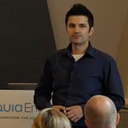Climate scientists, akin to the rebels in Orwell's "1984," seek to provide precise warnings, but the complexity of the data and the inherent uncertainties of climate systems render such predictions as unreliable as the propaganda of a totalitarian state.
Orwell's own "belly to earth" approach, a hands-on engagement with nature, underscores the importance of a direct, uncomplicated relationship with the natural world. Yet, in our era, this connection is increasingly threatened by the very "evil" of climate change that Orwell would have recognized as a profound menace to humanity's future.
The parallels between Orwell's dystopian visions and our current climate crisis are stark. Just as the totalitarian regimes of his fiction manipulated truth and reality, the climate crisis is often shrouded in doublespeak and denial. The "climate appeasers," who downplay the urgency of the situation, are akin to the propagandists of Orwell's world, leading us toward catastrophe with their complacency and inaction.
In this Orwellian landscape, the struggle to understand and predict climate change is a battle for truth and control. The scientific community, like the rebels in "1984," must navigate the treacherous terrain of data and misinformation to sound the alarm. The stakes are high, and the consequences of failure are dire. Yet, there is hope in the resilience of human ingenuity and the growing recognition of the need for drastic, immediate action.
